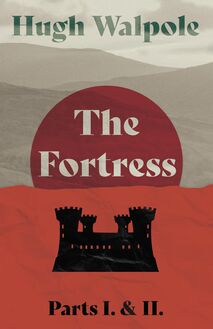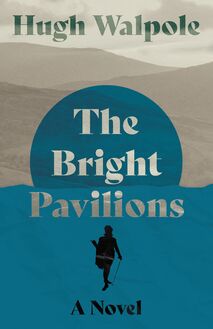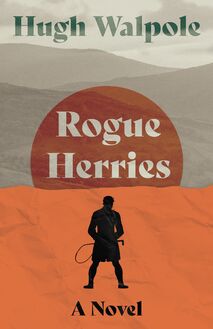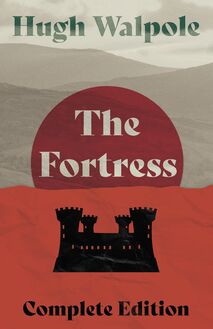-
 Univers
Univers
-
 Ebooks
Ebooks
-
 Livres audio
Livres audio
-
 Presse
Presse
-
 Podcasts
Podcasts
-
 BD
BD
-
 Documents
Documents
-
- Cours
- Révisions
- Ressources pédagogiques
- Sciences de l’éducation
- Manuels scolaires
- Langues
- Travaux de classe
- Annales de BEP
- Etudes supérieures
- Maternelle et primaire
- Fiches de lecture
- Orientation scolaire
- Méthodologie
- Corrigés de devoir
- Annales d’examens et concours
- Annales du bac
- Annales du brevet
- Rapports de stage
La lecture à portée de main
Vous pourrez modifier la taille du texte de cet ouvrage
Découvre YouScribe en t'inscrivant gratuitement
Je m'inscrisDécouvre YouScribe en t'inscrivant gratuitement
Je m'inscrisEn savoir plus
Vous pourrez modifier la taille du texte de cet ouvrage
En savoir plus

Description
The first part of the prequel to The Herries Chronicle period drama by Hugh Walpole.
A historical romance novel first published in 1940, The Bright Pavilions gives fans of the Herries family a glimpse into their life before Francis Herries’ move to the idyllic Lake District. Written after the release of the four Herries Chronicles novels, this prequel adds a new layer to the period drama.
Read & Co. Books has proudly republished The Bright Pavilions for the enjoyment of a new generation of historical family saga fans.
Sujets
Informations
| Publié par | Read Books Ltd. |
| Date de parution | 24 août 2022 |
| Nombre de lectures | 0 |
| EAN13 | 9781528797856 |
| Langue | English |
| Poids de l'ouvrage | 1 Mo |
Informations légales : prix de location à la page 0,0500€. Cette information est donnée uniquement à titre indicatif conformément à la législation en vigueur.
Extrait
THE BRIGHT PAVILIONS
A NOVEL
By
HUGH WALPOLE
First published in 1940
Copyright © 2022 Read & Co. Classics
This edition is published by Read & Co. Classics, an imprint of Read & Co.
This book is copyright and may not be reproduced or copied in any way without the express permission of the publisher in writing.
British Library Cataloguing-in-Publication Data A catalogue record for this book is available from the British Library.
Read & Co. is part of Read Books Ltd. For more information visit www.readandcobooks.co.uk
FOR RONALD STORRS IN FRIENDSHIP
Contents
Hugh Walpole
A DEDIC ATORY LETTER
PART I
THE BROTHERS
AN ENEMY
THE BRIG HT PAVILIONS
S YLVIA MASKED
THE MINERS
IN A HOUSE OF LIGH T AND DANGER
BARTHOLOMEW
SATAN I N WATENDLATH
ROBIN HERRIES LOQUITUR: HE LO SES HIS LADY
PART II
THE LOVERS AGAINST GOD
JOURNEY TO TH E DARK TOWER
THE CHILD IN TO THE WOMAN
THE FIGHT BY HAWKSHEAD
THE T HREE PRIESTS
PE RIL IN ESSEX
THE SIN
LONDON GLORY
THE MARTYR
PART III
THE PRISONERS
YO UNG ROSAMUND
THE BURNING
NICHOLAS ENCOUNTERS THE DEVIL AND DEFEATS HIM
CHARTLEY: THE QUEEN ENSLAVES HIM
TIXALL TRAP
THE CHRISTENING
THE INN AT FOTHERINGHAY: T HE STAIRCASE
THE LAST D AYS ON EARTH
THE CRUCIFIX
PART IV
THE ENEMY IN FLIGHT
ASHE S OF LETTERS
THERE SHALL BE N O PAIN THERE
NICHOL AS IN ARMOUR
FLIGHT FR OM A PHANTOM
END IN STORM
THE SU MMER WEDDING
THE QUEEN WAS IN HER PARLOUR
Hugh Walpole
Hugh Seymour Walpole was born in Auckland, New Zealand in 1884. He was educated at a series of boarding schools in England, followed by Emmanuel College, Cambridge. Walpole’s father hoped he would follow him into the clergy, but after three years as a missionary, in 1909, Walpole resolved to become a man of letters. His first commercial success came in 1911 with the novel Mr Perrin and Mr. Traill , after which Walpole made the acquaintance of writers such as Henry James and Joseph Conrad, and declared his ambition to become the greatest writer of his era. For the rest of his life, Walpole wrote prolifically. During the twenties he produced more than a novel a year, with The Cathedral (1922) and Wintersmoon (1928) proving to be great successes. In 1930, he began his most popular series of novels with the historical romance Rogue Herries , following it with Judith Paris (1931), The Fortress (1932) and Vanessa (1933). Eventually, he amassed an oeuvre of 36 novels, five volumes of short stories, two plays and three volumes of memoirs. He died in 1941, aged 57. Despite the fact that Walpole sold enormously well on both sides of the Atlantic, and was praised by many of his contemporaries, he is somewhat forgotten now, in part because he was overshadowed by P. G. Wodehouse and others.
A DEDICATORY LETTER
My dear Ronald,
In dedicating to you this Elizabethan romance I feel that I am doing myself much honour. It is with great pleasure that I give you something that has for two years absorbed my imagination. I would wish at the same time to warn all those critics or others who detest long historical novels, and especially the Herries variety, that this book is not for them. I would wish also to apologize to the friends of the ‘Herries Chronicles’ in that this volume has a certain grimness. Many of us, educated on boyish romances, have looked back to the Elizabethan period as one of music, dancing, colour, and the gallant rifling of Spanish treasure. Gallant it certainly was, but even as our present times are gallant—galla nt and grim.
For then, as now, the men and women of England were fighting a desperate and tenacious enemy. Then as now they were fighting for their lives. And, even as romantic novels go, I remember that ‘Westward Ho!’ painted the tortures of the Inquisition and that ‘Kenilworth’ is, with ‘The Bride of Lammermoor,’ the most sombre of all Scott’s novels. The Elizabethan Age was ferocious, cruel, superstitious, greedy and courageous.
Before I end my letter, I would like to acknowledge the great debt I owe to ‘The Tragedy of Fotheringay’ by the Hon. Mrs. Maxwell-Scott—a delightful and thr illing work.
Your affectionate friend, Hugh Walpole
The hills tell each other, and the list’ning
Valleys hear; all our longing eyes are turned
Up to thy bright pavilions: issue forth
And let thy holy feet visit our clime!
To Spring W illiam Blake
PART I
THE BROTHERS
AN ENEMY
On the grey afternoon of December 22nd, 1569, Nicholas Herries sat his lovely mare Juno on the moor inland from Silloth in Cumberland, every nerve alert because of the event that any instant might bring.
Nicholas, at this critical moment of his history, was twenty-five years of age, the son of Sir Michael Herries of Court Mallory, near Lewes in Sussex. He was a large young man, six foot four inches in height, of vast breadth of shoulder, a mighty chest, great thighs and a round, rosy-cheeked, merry-eyed head and a thick neck. He was not as yet fat, although later he might be. He was an exceedingly cheerful youn g gentleman.
Save for his attendant servant, Jack Oates, who sat his horse, obediently, at a distance, there was no other human body to be seen in all the vi sible world.
Nicholas wore a hat of green leather that sat firm and close on his head, round his thick neck a falling band, a green doublet close to his body, his boots black, long and close to the leg and the boothose some two inches higher than his boots and tied with points. The hilt of his sword was handsomely gilded. His mare and himself seemed like one. Not an inch of him stirred, and his servant, a little man with a cynical eye, was as still as he.
The scene was, at first glance, peaceful enough. A thin line of sea like a long attenuated skein of smoke was barely to be distinguished from the grey of the monotonous sky. The Scottish hills were like vapours of breath. In the bend of the moor close at hand could be seen the roofs of some hamlet. To the right like a mark of astonishment was a peel-tower raised many years ago against the Scot s marauders.
Otherwise not a sound, not a sign, save a hawk quivering above them, then suddenly plunging to its prey. But Nicholas, who was no fool for so big a young man, knew that there was more in the scene than met the eye. He was doubly engaged, for while he was so passionately alert for what was happening at his side, his mind was also introspectively moving around his own private personal world. Although he did not know it he was pursuing two opposite activities at one and th e same time.
He was thinking first and foremost of his young brother, Robin, whom he was that night to meet in the little town of Keswick. His young brother was his great duty to the world. Ever since that day when at the age of five he had been shown the white, thin face of that helpless infant in its froth of lace and silk, he had sworn that no harm should come to it. The contrast between his own five-year sturdy ruddiness and that fragility had struck deep to his heart. ‘Robin shall know no harm.’ That was his faith, and equal with it was his worship of his Queen. For a man so young he had already a clear view of her as she was—whimsical in personal fancy, parsimonious, often cruel, often coquetting from vanity, often jealous, often absurd in her love of flattery—but always with a passion for her country’s greatness which, however it might be confused with a passion for herself, was nevertheless a grand inspiration to all young men who sought to do great deeds even as N icholas did.
To these two faiths he added a third, and that was for his own immediate family. The small junior branch of Herries to which he belonged, although allied to the great family of Howard and, on another side, to the Herries of Lowland Scotland, was the subject of his simple and even spiritual worship. He would not be a Duke of Norfolk or Northumberland or Earl of Leicester. He would not be my Lord Herries although he followed what he could hear of that bold Earl’s doings with interest—but only Nicholas Herries, elder son of Sir Michael Herries of Court Mallory, and faithful member of that little group: his father’s brother, Sir Martin Herries, whom now he was going to visit; the Herries of Temple Guard near Salisbury; and a stray or two like his old cousin Penelope Herries of Dover; old Daniel Herries, a squire in Herefordshire; and his numerous cousinhood.
Here were his three faiths and they were all that he had, save only, the greatest of all, his faith in himself.
Now, at this present instant, all four faiths were concerned, for during the last few weeks there had been stirring deeds in North ern England.
Young Nicholas was no politician nor a religious man either. Anything his Queen might choose to do was right in his eyes. He was nevertheless young enough, full-blooded enough, adventurous enough, to be moved by the knowledge that Mary of Scotland was prisoner in England; lovely, helpless and, in spite of her forced resignation, a Queen. Some who had seen her said that she was not so lovely after all, others who knew her whispered that she was by no means so helpless—but there it was: she was a Queen and a prisoner. Nicholas cared nothing for the Roman Catholic religion nor very much for the Protestant either. This present world with its glories was sufficient for him. But there were others who thought differently, who had gone so far as to plan to marry the Duke of Norfolk to Mary of Scotland. The Duke of Northumberland with old Richard Norton and his seven sons and a number more hotheads with them had risen in the North, and on November 14th of this very year had entered Durham Cathedral, t
-
 Univers
Univers
-
 Ebooks
Ebooks
-
 Livres audio
Livres audio
-
 Presse
Presse
-
 Podcasts
Podcasts
-
 BD
BD
-
 Documents
Documents
-
Jeunesse
-
Littérature
-
Ressources professionnelles
-
Santé et bien-être
-
Savoirs
-
Education
-
Loisirs et hobbies
-
Art, musique et cinéma
-
Actualité et débat de société
-
Jeunesse
-
Littérature
-
Ressources professionnelles
-
Santé et bien-être
-
Savoirs
-
Education
-
Loisirs et hobbies
-
Art, musique et cinéma
-
Actualité et débat de société
-
Actualités
-
Lifestyle
-
Presse jeunesse
-
Presse professionnelle
-
Pratique
-
Presse sportive
-
Presse internationale
-
Culture & Médias
-
Action et Aventures
-
Science-fiction et Fantasy
-
Société
-
Jeunesse
-
Littérature
-
Ressources professionnelles
-
Santé et bien-être
-
Savoirs
-
Education
-
Loisirs et hobbies
-
Art, musique et cinéma
-
Actualité et débat de société
- Cours
- Révisions
- Ressources pédagogiques
- Sciences de l’éducation
- Manuels scolaires
- Langues
- Travaux de classe
- Annales de BEP
- Etudes supérieures
- Maternelle et primaire
- Fiches de lecture
- Orientation scolaire
- Méthodologie
- Corrigés de devoir
- Annales d’examens et concours
- Annales du bac
- Annales du brevet
- Rapports de stage














